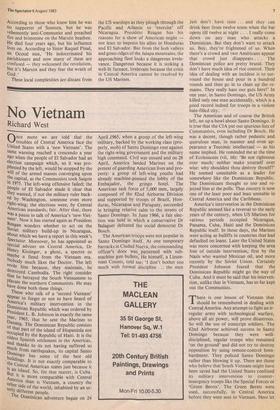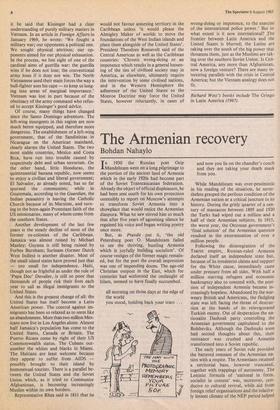No Vietnam
Richard West
Once more we are told that the troubles of Central America face the United States with a 'new Vietnam'. The same warning reached a crescendo a year ago when the people of El Salvador had an election campaign which, so it was pro- phesied by the left, would be stopped by the will of the armed masses converging upon the capital, as the Communists took Saigon in 1975. The left-wing offensive failed; the People of El Salvador made it clear that they wanted, if not the military ruler back- ed by Washington, someone even more right-wing; the elections were, by Central American standards, fair. After that, there was a pause in talk of America's 'new Viet- nam'. Now it has started again as President Reagan wonders whether to act on the Soviet military build-up in Nicaragua, about which we have a report in this week's Spectator. Moreover, he has appointed as special adviser on Central America, Dr Henry Kissinger, a ghost, a spectre or maybe a fiend from the Vietnam era. Nobody much likes the Doctor. The left revile him because, they maintain, he destroyed Cambodia. The right consider that he betrayed the South Vietnamese to Placate the northern Communists. He may have done both these things. Those who talk of a 'second Vietnam' appear to forget or not to have heard of America's military intervention in the Dominican Republic which was ordered by President L. B. Johnson in exactly the same Year, 1965, that he sent the Marines to Danang. The Dominican Republic consists of that part of the island of Hispaniola not occupied by the Republic of Haiti. It is the oldest Spanish settlement in the Americas, and thanks to its not having suffered so much from earthquakes, its capital Santo Domingo has some of the best old buildings. It is not exactly comparable to the Central American states just because it is an island. So, for that matter, is Cuba. But it is more comparable with Central America than is Vietnam, a country the other side of the world, inhabited by an ut- terly different people.
The Dominican adventure began on 24 April .1965, when a group of the left-wing military, backed by the working class (pro- perly, mob) of Santo Domingo rose against the right-wing government and the military high command. Civil war ensued and on 28 April, America landed Marines on the pretext of guarding American lives and pro- perty: a group of left-wing youths had already machine-gunned the lobby of the Embajador, the gringo hotel. The American task force of 5,000 men, largely composed of the 82nd Airborne Division and supported by troops of Brazil, Hon- duras, Nicaragua and Paraguay, succeeded in bringing relative calm to the streets of Santo Domingo. In June 1966, a fair elec- tion was held in which a conservative Dr Balaguer defeated the social democrat Dr Bosch.
The American troops were not popular in Santo Domingo itself. At one temporary barracks in Ciudad Nueva, the commanding officer's door was_ patterned with sub- machine gun bullets, He himself, a Lieute- nant Counts, told me; '1 don't bother too much with formal discipline ... the men
just don't have time ... and they can drink beer from twelve noon when the bar opens till twelve at night . . . I really come down on any man who attacks a Dominican. But they don't want to attack us. Boy, they're frightened of us. When there's a crowd and two Americans appear that crowd just disappears . . . The Dominican police are pretty brutal. They don't have much idea of riot control. Their idea of dealing with an incident is to sur- round the house and pour in a hundred rounds and then go in to clean up the re- mains. They really hate our guts here!' In one year, in Santo Domingo, the US Army killed only one man accidentally, which is a good record indeed for troops in a violent hate-filled city.
The American and of course the British left, set up a howl about Santo Domingo. It is true that the CIA put out spurious lists of Communists, even including Dr Bosch. He was a decent, though rather pedantic and querulous man, in manner and even ap- pearance a Teutonic intellectual — as his name implied. He reminded me at the time of Ecclesiastes (vii, 16): 'Be not righteous over much; neither make yourself over wise: why shouldest thou destroy thyself?' He seemed unsuitable as a leader for somewhere like the Dominican Republic. The Dominicans thought so too and re- jected him at the polls. That country is now one of the least poor and least unstable in Central America and the Caribbean.
America's intervention in the Dominican Republic seemed like a reversal to the early years of the century, when US Marines for various periods occupied Nicaragua, Panama, Cuba, Haiti and the Dominican Republic itself. In those days, the Marines were acting as bailiffs in countries that had defaulted on loans. Later the United States was more concerned with keeping the area free of outside intervention, first by the Nazis who wanted Mexican oil, and more recently by the Soviet Union. Certainly President Johnson feared that the Dominican Republic might go the way of Cuba. And it must be said that his interven- tion, unlike that in Vietnam, has so far kept out the Communists.
'There is one lesson of Vietnam that I should be remembered in dealing with Central America. Any attempt to fight an ir- regular army with technological warfare, above all air power, will prove disastrous. So will the use of conscript soldiers. The 82nd Airborne achieved success in Santo Domingo because they were well- disciplined, regular troops who remained 'on the ground' and did not try to destroy opposition by using remote-control bom- bardment. They policed Santo Domingo rather than blowing it up. There are those who believe that South Vietnam might have been saved had the United States confined its military intervention to counter- insurgency troops like the Special Forces or 'Green Berets'. The Green Berets were used, successfully, in Central America before they were sent to Vietnam. Here let
it be said that Kissinger had a clear understanding of purely military matters in Vietnam. In an article in Foreign Affairs in January 1969, he wrote: 'We fought a military war; our opponents a political one. We sought physical attrition; our op- ponents aimed for our physical exhaustion. In the process, we lost sight of one of the cardinal aims of guerilla war: the guerilla wins if he does not lose; the conventional army loses if it does not win. The North Vietnamese used their main forces the way a bull-fighter uses his cape — to keep us lung- ing into areas of marginal importance.' Vietnam was lost in part because of the obstinacy of the army command who refus- ed to accept Kissinger's good advice.
Of course, many things have changed since the Santo Domingo adventure. The left-wing insurgents in this region are now much better equipped, and therefore more dangerous. The establishment of a left-wing government, that of the Sandinistas in Nicaragua on the American mainland, clearly alarms the United States. The two most stable countries, Mexico and Costa Rica, have run into trouble caused by respectively debt and urban terrorism. On the other hand, little Honduras, the quintessential banana republic, now seems to enjoy a civilian and liberal government; El Salvador, as already noted, has so far spurned the communists; while in Guatemala, according to the Guardian, the Indian peasantry is leaving the Catholic Church because of its Marxism, and turn- ing to the born-again Protestant faith of the US missionaries, many of whom come from the southern States.
AnOther development of the last few years is the steady decline of most of the former ex-colonies of the Caribbean. Jamaica was almost ruined by Michael Manley; Guyana is still being ruined by Forbes Burnham; Surinam (former Dutch West Indies) is another disaster. Most of the small island states have proved just that — too small for independence. Haiti, though not as frightful as under the rule of 'Papa Doc' Duvalier, is still so poor that thousands of people risk their lives each year to sail as illegal immigrants to the United States.
And this is the greatest change of all: the United States has itself become a Latin American power. The control against im- migrants has been so relaxed as to seem like an abandonment. More than two million Mex- icans now live in Los Angeles alone. Almost half Jamaica's population has come to the United States, Canada or Britain. The Puerto Ricans come by right of their US Commonwealth status. The Cubans out- number the whites and blacks in Miami. The Haitians are least welcome because they appear to suffer from AIDS possibly brought to their island by homosexual tourists. There is a parallel be- tween the United States and the Soviet Union which, as it tried to Communise Afghanistan, is becoming increasingly Muslim within its own borders.
Representative Rhea said in 1811 that he would not favour annexing territory in the Caribbean unless `it would please the Almighty Maker of worlds to move the foundations of the West Indian islands and place them alongside of the United States'. President Theodore Roosevelt said of the Central American as well as the Caribbean countries: 'Chronic wrong-doing or an impotence which results in a general loosen- ing of the ties of civilised society may in America, as elsewhere, ultimately require the intervention by some civilised nations, and in the Western Hemisphere the adherence of the United States to the Monroe Doctrine may force the United States, however reluctantly, in cases of
wrong-doing or impotence, to the exercise of the international police power.' But to what extent is it now international? The frontier between Latin America and the United States is blurred; the Latins are taking over the south of the big power that threatens them, just as the Muslims are tak- ing over the southern Soviet Union. Is Cen- tral America, any more than Afghanistan, now a foreign venture? There are many in- teresting parallels with the crisis in Central America; but the Vietnam analogy does not fit.
Richard West's books include The Gringo in Latin America (1967).







































 Previous page
Previous page